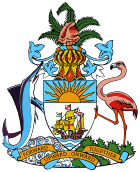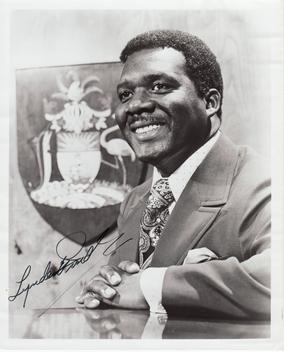
Sir Lynden Oscar Pindling, KCMG, PC, NH, JP was a Bahamian politician who is regarded by some as the "Father of the Nation", having led the Bahamas to majority rule and independence.

Perry Gladstone Christie PC, MP is a Bahamian former politician who served as Prime Minister of the Bahamas from 2002 to 2007 and from 2012 to 2017. He is the second longest-serving Bahamian elected parliamentarian, representing the Centreville constituency from 1977 to 2017. He is also a former athlete. His Progressive Liberal Party is the oldest Bahamian political party, holding solid majorities in the Bahamian Parliament several times in its long history.
The Free National Movement is a political party in The Bahamas formed in the early 1970s, led by Sir Cecil Wallace-Whitfield. The current leader of the party is Michael Pintard and the current deputy leader is Shanendon Cartwright. It dominated the general election held on 10 May 2017, winning 35 of the 39 seats in the Legislature, but was defeated in 2021, losing 28 seats.

Hubert Alexander Ingraham, PC is a Bahamian politician who was Prime Minister of the Bahamas from August 1992 to May 2002 and again from May 2007 to May 2012. He is a member of the Free National Movement Party (FNM). Prior to the 2012 election, he was the FNM's Party Leader and was the Member of Parliament for the North Abaco constituency. He served as Leader of the Opposition in the House of Assembly from 2005 to 2007.

Elections in the Bahamas take place in the framework of a parliamentary democracy. Since independence, voter turnout has been generally high in national elections, with a low of 87.9% in 1987 and a high of 98.5% in 1997. The current Prime Minister is The Hon. Philip Davis.
Online gambling is any kind of gambling conducted on the internet. This includes virtual poker, casinos, and sports betting. The first online gambling venue opened to the general public was ticketing for the Liechtenstein International Lottery in October 1994. Today, the market is worth around $40 billion globally each year, according to various estimates.
Gambling in the United Kingdom is regulated by the Gambling Commission on behalf of the government's Department for Digital, Culture, Media and Sport (DCMS) under the Gambling Act 2005. This Act of Parliament significantly updated the UK's gambling laws, including the introduction of a new structure of protections for children and vulnerable adults, as well as bringing the burgeoning Internet gaming sector within British regulation for the first time.

The Southern Rhodesia sweepstakes referendum of February 1934 saw the voters of Southern Rhodesia vote to permit the running of sweepstakes gambling "under strict legislative control", managed by the government of the colony.
Gaming law is the set of rules and regulations that apply to the gaming or gambling industry. Gaming law is not a branch of law in the traditional sense but rather is a collection of several areas of law that include criminal law, regulatory law, constitutional law, administrative law, company law, contract law, and in some jurisdictions, competition law. At common law, gambling requires consideration, chance and prize, legal terms that must be analyzed by gaming lawyers within the context of any gaming operation.

General elections were held in the Bahamas on 2 May 2007. The result was an opposition victory, with the Free National Movement, led by former Prime Minister Hubert Ingraham, claiming 23 of the 41 seats. Incumbent Prime Minister Perry Christie conceded defeat in a phone call to his rival. Ingraham was sworn into the office of Prime Minister on 4 May.

General elections were held in the Bahamas on 2 May 2002. The opposition Progressive Liberal Party (PLP) won 29 of the 40 seats in the House of Assembly to defeat the governing Free National Movement (FNM). Voter turnout was 90.2%.
Gambling in South Africa has been heavily restricted since 1673, with South Africa's Gambling Act of 1965 officially banning all forms of gambling except betting on horse racing which existed as a sporting activity.
Gambling in Pennsylvania includes casino gambling, the Pennsylvania Lottery, horse racing, bingo, and small games of chance conducted by nonprofit organizations and taverns under limited circumstances. Although casino gaming has been legal for less than two decades, Pennsylvania is second only to Nevada in commercial casino revenues.
Gambling in Ukraine was illegal between 2009 and 2020.
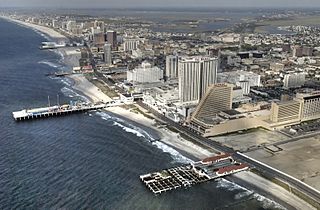
Gambling in New Jersey includes casino gambling in Atlantic City, the New Jersey Lottery, horse racing, off-track betting, charity gambling, amusement games, and social gambling. New Jersey's gambling laws are among the least restrictive in the United States. In 2013, the state began to allow in-state online gambling. Five years later, the state won a lawsuit that dismantled Nevada's monopoly on legal sports betting.
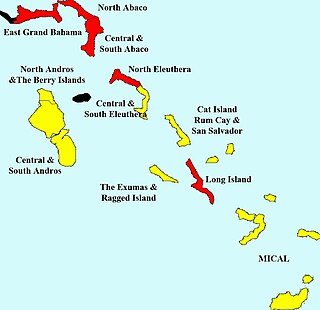
General elections were held in the Bahamas on 7 May 2012. They were the first general election in which a third party offered a full slate of candidates alongside the two major parties, the Free National Movement and the Progressive Liberal Party (PLP). The result was a victory for the opposition PLP, whose leader Perry Christie became prime minister.

Gambling in Taiwan is prohibited by the Criminal Code of the Republic of China. State-run lotteries, like the Uniform Invoice lottery, are the only legal form of gambling on mainland Taiwan. The construction of casinos on some off-shore islands was legalized in 2009, though to date none have been built. Some gambling-style games are allowed either on special days or under special restricted circumstances.
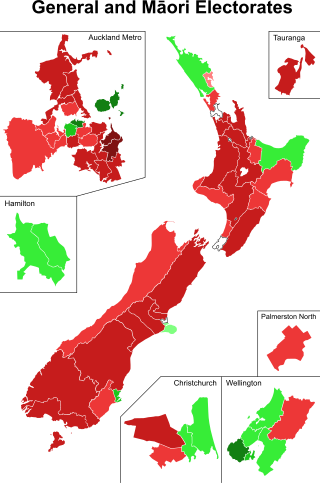
The 2020 New Zealand cannabis referendum was a non-binding referendum held on 17 October 2020 in conjunction with the 2020 general election and a euthanasia referendum, on the question of whether to legalise the sale, use, possession and production of recreational cannabis. It was rejected by New Zealand voters. The form of the referendum was a vote for or against the proposed "Cannabis Legalisation and Control Bill". Official results were released by the Electoral Commission on 6 November 2020 with 50.7% of voters opposing the legalisation and 48.4% in support.
The history of gambling in the United States covers gambling and gaming since the colonial period.
Federal referendums were held in Switzerland on 7 March, 13 June, 26 September, and 28 November 2021. Swiss referendums take three forms: popular initiatives, which are citizen proposals to create a new law and require 100,000 valid signatures on a petition to get on the ballot; facultative or optional referendums, which are citizen proposals to approve or reject a piece of existing law and require 50,000 valid signatures on a petition to get on the ballot; and mandatory referendums, which are required to revise the constitution, join an international organisation or introduce emergency federal legislation for over a year.
